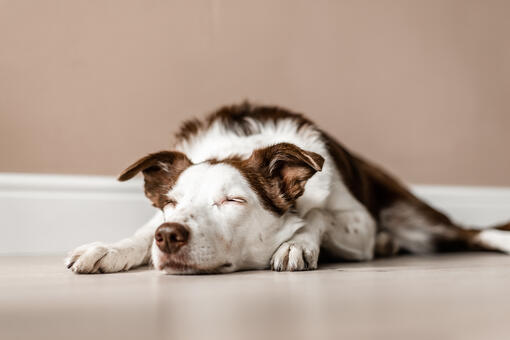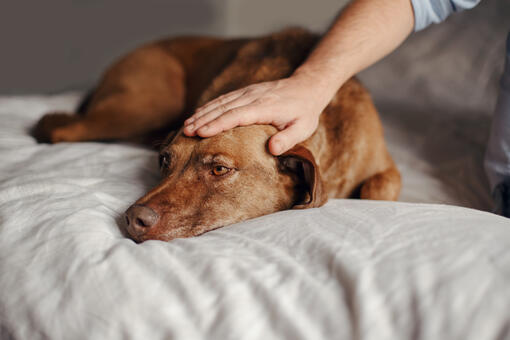
Regular sleep, exercise, a comfortable bed, and a healthy diet are crucial for a dog's wellbeing. If you do spot any drastic sleep changes, it’s always best to visit your vet for reassurance.
Read on to find out more about the typical sleep changes in senior dogs, the causes behind these, how to identify potential sleep problems and some strategies for improving these issues.
Your Dog’s Sleep Cycle
Dogs experience numerous sleep cycles, which they move through faster than humans. The sleep cycle can be split into rapid eye movement (REM) and non-rapid eye movement (NREM) stages. Stages during NREM may be associated with deep breathing, slower heart rate, and lower blood pressure. During REM sleep, you may see twitches, barks, and whines as the dog dreams.
Typical Sleep Changes in Senior Dogs
It's common for an older dog to experience changes in its sleep habits. Senior dogs tend to:
- Sleep more during the day: Their energy levels naturally decrease, meaning longer naps and a longer overall sleep duration. They might doze for 16-20 hours a day, compared to an adult dog's 12-18 hours.
- Wake up more at night: Instead of sleeping soundly through the night, senior dogs might have shorter naps and wake up more often. It's like they take little sleep breaks in between their deeper sleeps.
These changes may be a normal part of the ageing process, similar to what we experience. However, it's crucial to be able to distinguish between these typical sleep adjustments and signs of potential health problems.
Identifying Sleep Issues in Senior Dogs
It’s essential to monitor your senior dog’s sleep patterns to identify any issues early. Signs that your dog may not be sleeping well include:
- Restlessness at night
- Pacing or whining
- Difficulty settling down
- Frequent waking up during the night
- Changes in daytime sleep patterns
If you notice that your dog won't settle at night or is experiencing any of these signs, it may indicate an underlying problem that requires veterinary attention.
Causes of Sleep Changes in Senior Dogs
Several factors can contribute to changes in dog sleep patterns as they age, including:
Health problems such as arthritis can be uncomfortable and disturb sleep. Cognitive dysfunction can make it harder for an elderly dog to settle at night. Sensory decline can also affect your dog’s depth of sleep. As dogs age, their senses weaken, and whilst this can be just a normal sign of ageing, keep an eye out for stumbling, deafness, startling, appetite loss, confusion, or aggression.
Like humans, dogs can experience these emotions, and the effects show through sleep disturbances. Restlessness is a common sign – you might find your dog pacing, whining, or fidgeting instead of settling down. They might also become hypervigilant, easily startled awake by minor noises or movements. In extreme cases, dogs can suffer from panic attacks. If you suspect your dog is struggling with anxiety or stress, consulting your vet can help identify the cause and find ways to manage it.
Even seemingly minor changes can throw them off balance. A new baby in the house, a shift in your work schedule leading to an inconsistent bedtime routine, or even moving their bed to a different location can all contribute to restless nights.
Strategies for Improving Sleep Quality in Senior Dogs
As our dogs get older, making sure they get a good night's sleep becomes even more important. Let's explore how to create a comfy sleep space and address any issues that might be keeping them awake at night:
A Comfortable Bed
Invest in a high-quality dog bed designed for older dogs. This can help senior dogs with Hip Dysplasia, for example, sleep more comfortably.
Consistent Routine
Structure is key for older dogs. Maintain a consistent daily routine, with set times for meals and walks to reduce anxiety and help your dog feel more secure.
Quiet Environment
Ensure their sleeping area is quiet and free from any noise disturbances, with a designated space away from major household activities and noisy appliances.
Regular Exercise
Moderate exercise can be a powerful sleep aid for your senior dog. Physical activity burns off excess energy, making them feel more tired and ready for a good night’s sleep. Aim for daily walks or playtime sessions that are appropriate for your dog's age and limitations.
Diet and Hydration
Digestive discomfort or dehydration can disrupt sleep, so talk to your vet about feeding your senior dog the right food and maintaining proper hydration.
Creating a Senior Dog-Friendly Home
Adapting your home environment to accommodate the needs of your older dog can significantly improve their quality of life. Consider making the following adjustments:
- Accessible Sleeping Areas: Ensure that your dog’s bed is easily accessible, especially if they have mobility issues. Avoid placing their bed in areas with stairs or other obstacles.
- Temperature Control: Older dogs may be more sensitive to temperature extremes. Ensure their sleeping area is kept at a comfortable temperature, not too hot or too cold.
- Night Lights: If your dog has vision problems, consider using night lights to help them navigate their sleeping area during the night.
- Non-slip mats: may reduce the risk of injury if you have slippery flooring such as tiles or wood.
The Importance of Regular Vet Check-ups
Regular veterinary check-ups are crucial for senior dogs, especially when changes in sleep patterns occur. A vet can conduct a thorough examination to rule out any underlying health issues that might be contributing to sleep disturbances.
Conditions such as arthritis, cognitive dysfunction syndrome (CDS), and other age-related ailments can often be managed more effectively with early diagnosis and treatment. During the check-up, be sure to discuss your dog's sleep habits in detail, including any specific concerns you have. This will help your vet provide the best possible care for your senior dog and ensure they remain comfortable and healthy in their golden years.









